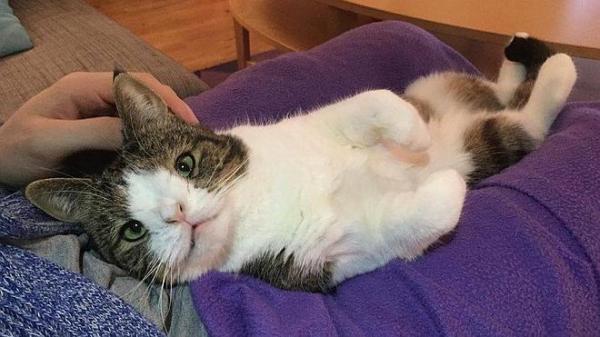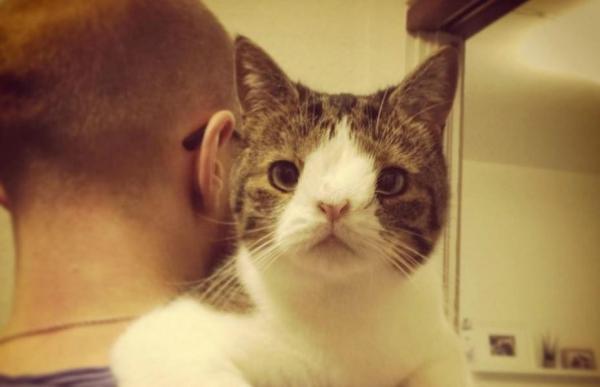Are There Cats With Down Syndrome?



See files for Cats
You may have seen some photos of cats with an atypical appearance. Differences in appearance can vary according to breed, but some cats have an appearance which imply they have a genetic disorder. In fact, the features of some atypical cats appear to be similar to certain genetic human conditions such as Down syndrome. We may have even seen posts published on social media or other sources which claim cats can have this condition.
At AnimalWised, we ask are there cats with down syndrome? Whether feline down syndrome exists, there are certain genetic conditions which can change the appearance, behavior and overall health of a cat. We explore these possible conditions in more detail.
Can cats have Down syndrome?
No, cats cannot have Down syndrome. The reason for this is due to their chromosomal makeup. Down syndrome is a genetic disorder that affects 1 in 700 human babies each year in the United States of America. It occurs during the development of the fetus. The genetic information from the fetus's 21st chromosome is incorrectly copied and results in a partial or complete additional chromosome.
This additional chromosome is known as a trisomy and it leads to various developmental issues. Physical malformations cause certain characteristics traits, including those known as facies. These are characteristic facial features which are common to the condition. Since cats can have genetic disorders which result in facial changes, it is likely the reason some people confuse these disorders with Down syndrome.
While healthy primates and humans have 23 pairs of chromosomes, cats only have 19 pairs. Since Down syndrome is a mutation of the 21st chromosome, it is impossible for cats to have feline down syndrome as they don't have 21 chromosomes.
Why can't cats have Down syndrome?
Cats cannot have Down syndrome because they lack chromosome 21, they only have 19 pairs. It is impossible for them to have the genetic anomaly that characterizes this disease as they cannot produce the trisomy it requires.
However, cats can suffer alterations in other pairs of chromosomes. These can produce anomalies and congenital malformations that induce anatomical alterations which can affect the physical, cognitive or mobility of cats. The resultant conditions may resemble human Down syndrome, but are in no way its equivalent.
Down syndrome-like symptoms in cats
The reason many people believe cats can have down syndrome is due to abnormalities in their development. These are both physical and behavioral characteristics which can resemble human Down syndrome. A popular example is a feline known as ‘Grumpy Cat’, a cat which became famous on social media due to her ‘grumpy’ appearance. This appearance was caused by a form of dwarfism.
The symptoms which present in cats that can resemble human Down syndrome include the following:
- Eyes set wide apart, curved up, small or misshapen
- Sad facial appearance
- Different size or shape of ears
- Flat or upturned nose
- Low muscle tone
- Hearing or vision loss
- Small size
- Heart defects
- Mobility issues
- Difficulty in urination or defecation

Conditions similar to Down syndrome in cats
The aforementioned symptoms may be due to various feline medical issues. These are not limited to congenital anomalies as infections, pathologies and even trauma can cause them. They include the following causes:
Inbreeding
The crossing of closely-related cats with each other can predispose to the development of mental and physical abnormalities. These may present in a way similar to the symptoms of a person with Down syndrome. Specifically, morphological abnormalities in the face and mouth, as well as alterations to motor skills or the cardiac system stand out.
When we adopt a cat, it is always advisable to opt for sterilization. This provides health and behavioral benefits to the individual cat, but also helps the greater feline populations which are struggling to have their needs met. This is especially important when you have sexually mature cats which are closely related in the same home. If they were to mate, it can lead to cats with serious health problems and a relatively-low quality of life.
Learn more about these advantages and considerations with our guide to neutering a cat.
Feline panleukopenia
The feline panleukopenia virus is a parvovirus which produces cerebellar hypoplasia in kittens when the mother is infected while pregnant. This hypoplasia produces cerebellar clinical signs that make coordination of movement difficult due to the incomplete development of the cerebellum. This is the part of the brain that affects coordination and movement control. For this reason, it is another feline disease that can be confused with Down syndrome.
Poisoning during pregnancy
When a pregnant cat is exposed to certain toxins, these can have a teratogenic effect, i.e. it induces neurological abnormalities and malformations in the fetuses. The result are kittens with the appearance of Down syndrome.
Feline dysautonomia
Dysautonomia is a degenerative disease that affects the autonomic nervous system of the feline. It produces clinical signs such as incontinence, reduction or loss of muscle tone, lack of appetite, weight loss and low or droopy eyes.
Klinefelter syndrome
Klinefelter syndrome is another genetic abnormality in which male cats have an extra X chromosome, being XXY instead of XY. In addition to infertility and the presence of tricolored coats, it causes developmental problems that can result in physical abnormalities, poorer bone density and cognitive problems. Although male cats can have a tricolored calico coat pattern, they are more likely to have health problems if they do.
Distal polyneuropathy
Distal polyneuropathy is a nerve problem derived from diabetes. It produces clinical signs such as paralysis, instability, tremors, seizures and motor skill weakness.
Trauma
Especially if they occur at a very young age, traumas to the face or head can permanently modify their anatomy. They may produce facial injuries and permanent neurological damage that can resemble Down syndrome.
Caring for cats with symptoms similar to Down syndrome
When a cat has birth defects which result in crossed eyes, dwarfism or other types of malformation, it doesn't mean their quality of life and life expectancy can vary differently. Some may have a severely reduced life expectancy and may have physical impairments which greatly affect their quality of life. Others may be able to lead a relatively normal life with the right level of care.
In nature, kittens born with birth defects are often killed by their mother. This is for survival purposes as the mother cat will likely be unable to provide the care they need for survival. Instead she will kill the affected newborn so she can focus her attention on the remaining litter. However, human guardians may be able to provide the right level of care for a kitten with these impairments. This will be after consultation with a veterinarian for diagnosis and assessment of care options.
Cats with malformation issues will need different levels of care. They will usually need more frequent veterinary checkups and will generally need more attentive maintenance. Some malformations can make eating difficult, so the cat may not be able to eat on their own in acute cases. This may only be when they are kittens, but it will depend on the extent of the malformation.
For cats with impaired motor function, their environment will need to be adapted accordingly. We will need to remove certain obstacles and provide better access to accessories such as their litter box. They may need other support and even physical therapy in some cases. The correct toys and accessories will also be required to best ensure proper development.
Although cats do not have Down syndrome, they can have a variety of issues which can affect their development. They may need some help, but with the right level of care and love, a cat with congenital deformities or other abnormalities may be able to live a happy and healthy life.
What animals can have Down syndrome?
Only humans and primates can develop Down syndrome. This is because they are the only organisms with a 21st pair of chromosomes. It is a condition which does not occur in other animals such as cats, dogs, farm animals or wild animals.
Despite not being able to develop Down syndrome, all animals have pairs of chromosomes that can be affected by genetic abnormalities. They will induce various malformations, as well as motor and mental difficulties. For example, trisomy of chromosome 16 in mice is well known. Mice have 19 pairs of chromosomes and the 16th contains genes that are practically identical to those of human chromosome 21.
This article is purely informative. AnimalWised does not have the authority to prescribe any veterinary treatment or create a diagnosis. We invite you to take your pet to the veterinarian if they are suffering from any condition or pain.
If you want to read similar articles to Are There Cats With Down Syndrome?, we recommend you visit our Other health problems category.
- Florez, J. (n.d.). Animal models in Down syndrome. Retrieved from: https://www.downciclopedia.org/genetica/peculiaridades-en-el-sindrome-de-down/2926-Modelos-animales-en-el-sindrome-de-down.html






